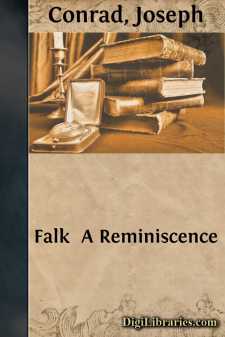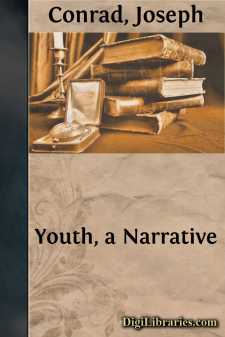Categories
- Antiques & Collectibles 13
- Architecture 36
- Art 48
- Bibles 22
- Biography & Autobiography 813
- Body, Mind & Spirit 142
- Business & Economics 28
- Children's Books 15
- Children's Fiction 12
- Computers 4
- Cooking 94
- Crafts & Hobbies 4
- Drama 346
- Education 46
- Family & Relationships 57
- Fiction 11828
- Games 19
- Gardening 17
- Health & Fitness 34
- History 1377
- House & Home 1
- Humor 147
- Juvenile Fiction 1873
- Juvenile Nonfiction 202
- Language Arts & Disciplines 88
- Law 16
- Literary Collections 686
- Literary Criticism 179
- Mathematics 13
- Medical 41
- Music 40
- Nature 179
- Non-Classifiable 1768
- Performing Arts 7
- Periodicals 1453
- Philosophy 64
- Photography 2
- Poetry 896
- Political Science 203
- Psychology 42
- Reference 154
- Religion 513
- Science 126
- Self-Help 84
- Social Science 81
- Sports & Recreation 34
- Study Aids 3
- Technology & Engineering 59
- Transportation 23
- Travel 463
- True Crime 29
Romance
by: Joseph Conrad
Description:
Excerpt
CHAPTER ONE
To yesterday and to to-day I say my polite "vaya usted con Dios." What are these days to me? But that far-off day of my romance, when from between the blue and white bales in Don Ramon's darkened storeroom, at Kingston, I saw the door open before the figure of an old man with the tired, long, white face, that day I am not likely to forget. I remember the chilly smell of the typical West Indian store, the indescribable smell of damp gloom, of locos, of pimento, of olive oil, of new sugar, of new rum; the glassy double sheen of Ramon's great spectacles, the piercing eyes in the mahogany face, while the tap, tap, tap of a cane on the flags went on behind the inner door; the click of the latch; the stream of light. The door, petulantly thrust inwards, struck against some barrels. I remember the rattling of the bolts on that door, and the tall figure that appeared there, snuffbox in hand. In that land of white clothes, that precise, ancient, Castilian in black was something to remember. The black cane that had made the tap, tap, tap dangled by a silken cord from the hand whose delicate blue-veined, wrinkled wrist ran back into a foam of lawn ruffles. The other hand paused in the act of conveying a pinch of snuff to the nostrils of the hooked nose that had, on the skin stretched tight over the bridge, the polish of old ivory; the elbow pressing the black cocked-hat against the side; the legs, one bent, the other bowing a little back—this was the attitude of Seraphina's father.
Having imperiously thrust the door of the inner room open, he remained immovable, with no intention of entering, and called in a harsh, aged voice: "Señor Ramon! Señor Ramon!" and then twice: "Sera-phina—Seraphina!" turning his head back.
Then for the first time I saw Seraphina, looking over her father's shoulder. I remember her face on that day; her eyes were gray—the gray of black, not of blue. For a moment they looked me straight in the face, reflectively, unconcerned, and then travelled to the spectacles of old Ramon.
This glance—remember I was young on that day—had been enough to set me wondering what they were thinking of me; what they could have seen of me.
"But there he is—your Señor Ramon," she said to her father, as if she were chiding him for a petulance in calling; "your sight is not very good, my poor little father—there he is, your Ramon."
The warm reflection of the light behind her, gilding the curve of her face from ear to chin, lost itself in the shadows of black lace falling from dark hair that was not quite black. She spoke as if the words clung to her lips; as if she had to put them forth delicately for fear of damaging the frail things. She raised her long hand to a white flower that clung above her ear like the pen of a clerk, and disappeared. Ramon hurried with a stiffness of immense respect towards the ancient grandee. The door swung to.
I remained alone. The blue bales and the white, and the great red oil jars loomed in the dim light filtering through the jalousies out of the blinding sunlight of Jamaica....












